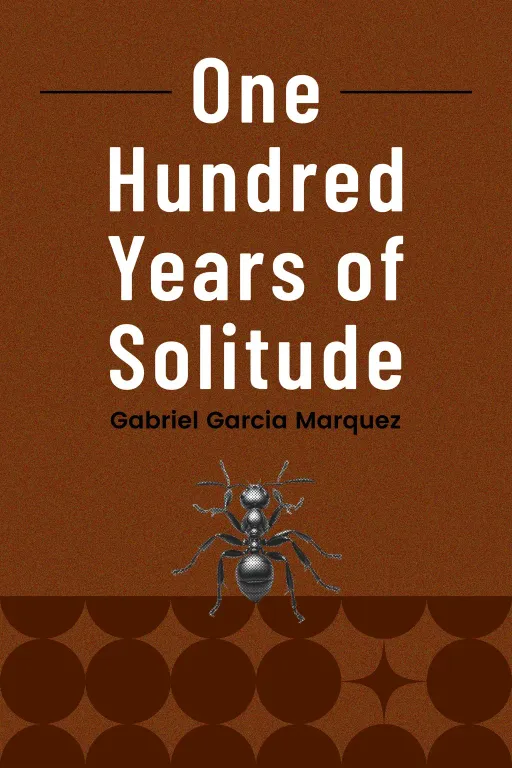
One Hundred Years of Solitude
11 minIntroduction
Narrator: Many years later, as he faced the firing squad, Colonel Aureliano Buendía was to remember that distant afternoon when his father took him to discover ice. This single, haunting sentence opens a world where the boundaries between memory and prophecy, life and death, are as fluid as water. It is the story of a family and a town so isolated that they must invent their own reality, only to see it consumed by the very forces they unleash. This is the epic, cyclical, and magical world of the Buendía family, chronicled in Gabriel Garcia Marquez’s masterpiece, One Hundred Years of Solitude. The book traces the rise and fall of the mythical town of Macondo through seven generations of a family cursed by an inescapable fate, a profound and unshakable solitude.
The Genesis of Solitude: Founding a World of Mirrors
Key Insight 1
Narrator: The story of the Buendía family begins with an act of violence and a flight from the past. The patriarch, José Arcadio Buendía, kills a man named Prudencio Aguilar in a duel over an insult to his honor. Haunted by the man’s ghost, José Arcadio Buendía leads a group of young families on an arduous journey through the jungle, seeking a place untouched by the weight of their conscience. After a dream of a city with walls of mirrors, he founds Macondo on the banks of a stony river, a village so new that many things still lacked names.
This initial act of isolation sets the stage for the family’s defining trait: a profound solitude. The Buendías are a family of extremes, driven by obsessive passions. José Arcadio Buendía himself becomes consumed by the gypsies' inventions—magnets, magnifying glasses, and alchemy—in a manic pursuit of knowledge that ultimately drives him mad, leading him to be tied to a chestnut tree in the backyard for the rest of his days. This solitude is compounded by a family curse. As cousins, José Arcadio Buendía and his wife, Úrsula Iguarán, live in fear of bearing a child with the tail of a pig, a punishment for their incestuous union. This fear becomes a self-fulfilling prophecy that haunts their lineage, creating a closed-off world where the family turns inward, repeating its mistakes in a tragic, inescapable spiral.
The Illusions of Progress: Ice, Railroads, and Insomnia
Key Insight 2
Narrator: Macondo’s isolation is repeatedly punctured by waves of "progress," each arriving with a sense of wonder before revealing its disruptive, and often destructive, nature. The first harbingers are the gypsies, led by the mysterious Melquíades, who bring marvels like ice, which José Arcadio Buendía declares "the great invention of our time." These inventions spark a feverish desire for modernity but often lead to disappointment and obsession.
This cycle of illusion and disillusionment reaches a surreal peak with the arrival of the insomnia plague. Brought to Macondo by the orphan Rebeca, the plague prevents anyone from sleeping and, more terrifyingly, begins to erase their memories. To combat this, Aureliano Buendía devises a system of labeling everything—the table, the chair, the cow—with its name and function. The sign hung on the town’s entrance reads, "Macondo," and a larger one on the main road declares, "God exists." The plague represents the fragility of reality and history, a theme that deepens when the railroad finally arrives. The train brings not just new people and technologies like the cinema, but also the American banana company. This corporation transforms Macondo, creating a separate, privileged town for the "gringos" and exploiting the land and its people, ultimately leading to a violent strike and a massacre that the government erases from history, proving that the most dangerous loss of memory is the one that is deliberately enforced.
The Futility of War and the Corruption of Power
Key Insight 3
Narrator: The Buendía family is thrust onto the national stage by Colonel Aureliano Buendía, one of the most unforgettable characters in literature. Initially a quiet silversmith, he is drawn into the country’s endless civil wars. He becomes a legendary Liberal general who organizes thirty-two armed uprisings and loses them all. He survives fourteen attempts on his life, seventy-three ambushes, and a firing squad.
Yet, his long war is a journey into solitude and disillusionment. He fights for ideals that are eventually betrayed by his own party’s politicians, who are more interested in power than principle. He realizes with a chilling clarity that he is fighting simply out of pride. The war hardens him, stripping him of his capacity for love and leaving an icy void in his heart. This corruption of power is mirrored in his nephew, Arcadio, whom he leaves in charge of Macondo. Arcadio quickly becomes a petty tyrant, issuing absurd decrees and ruling by terror until he is executed by the Conservatives. In the end, Colonel Aureliano Buendía signs a peace treaty, refuses all honors, and returns to his workshop to spend the rest of his life making and melting down little gold fishes, trapped in the circular, solitary futility of his own existence.
The Inescapable Cycle: History Repeats in a Spiral
Key Insight 4
Narrator: The Buendía family is trapped in a recurring loop of history. Names and personalities repeat with fatalistic precision. The men named José Arcadio are impulsive, physically powerful, and often tragic figures, while the men named Aureliano are solitary, intellectual, and drawn to war or esoteric knowledge. The women, particularly the long-suffering matriarch Úrsula, watch as their sons and grandsons repeat the same mistakes, driven by the same passions and condemned to the same solitude.
This cycle is not just one of personality but of events. Forbidden love affairs, political violence, and obsessive pursuits reappear in each generation. The seventeen illegitimate sons of Colonel Aureliano Buendía, each named Aureliano and marked with an indelible cross of ash on their foreheads, are systematically hunted down and murdered, a brutal echo of the political violence that defined their father’s life. The family seems incapable of learning from the past, destined to relive it. As Úrsula herself realizes late in her life, time in Macondo does not pass in a straight line but turns in a circle, trapping the Buendías in a labyrinth of their own making.
The Prophecy Fulfilled: A Hurricane of Oblivion
Key Insight 5
Narrator: The family’s fate was written down long ago by the gypsy Melquíades, on parchments that no Buendía could decipher for a century. The final generation brings the prophecy to its devastating conclusion. Amaranta Úrsula returns from Europe with her husband, Gaston, full of life and determined to revitalize the decaying house. She finds her nephew, Aureliano Babilonia, a recluse who has spent his life in solitude, trying to translate Melquíades' manuscripts.
An irresistible, forbidden passion grows between them. After Gaston leaves, they give in to a love that is all-consuming, a love so powerful it makes them oblivious to the world crumbling around them. They are the first Buendías in a century to love so freely, but their love is the final, fatal act in the family’s history. Amaranta Úrsula gives birth to a son—the first child in the family conceived with love—but he is born with the tail of a pig, fulfilling the family’s oldest fear. Amaranta Úrsula dies in childbirth, and as a grief-stricken Aureliano wanders the desolate town, the baby is eaten by ants. In that moment of ultimate solitude, Aureliano finally deciphers the parchments. He reads the entire history of his family, written one hundred years in advance, and understands that it was all a predetermined story. As he reads the final lines, a biblical hurricane descends upon Macondo, wiping the town and the entire Buendía lineage from the face of the earth.
Conclusion
Narrator: The single most important takeaway from One Hundred Years of Solitude is captured in its final, devastating line: "races condemned to one hundred years of solitude did not have a second opportunity on earth." The Buendía family's tragedy is not just a result of external forces like war or colonialism, but of an internal failure—an incapacity for true, empathetic love that locks each member in their own private solitude. They are so consumed by their own obsessions, their pride, and their past that they cannot connect with one another, dooming them to repeat their history until there is no history left to repeat.
The book stands as a towering myth, not just for Latin America but for all of humanity. It challenges us to look at the cycles in our own lives and societies. Are we, too, trapped in a history we are condemned to repeat? Or can we break the spell of solitude, learn from the past, and finally earn a second opportunity on earth?









